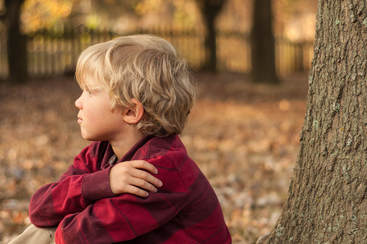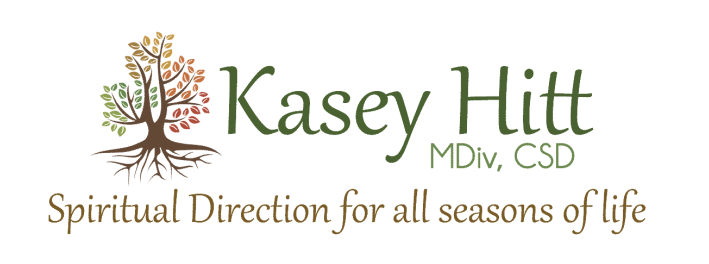 Photo by Jacqueline Martinez on Unsplash Photo by Jacqueline Martinez on Unsplash There are those poems and prayers that one returns to again and again. This is one of those for me. Patient Trust was written by Pierre Teilhard de Chardin, a Jesuit biologist, philosopher, and paleontologist. Paleontology is the study of ancient life and its changes through the fossil record. Fossils take a long time to form. The processes Chardin observed in nature, he also observed in the soul. Let's not forget that we, too, are part of nature! And the Earth has wisdom to share with us who are often hurried and harried. Patient Trust Above all, trust in the slow work of God. We are quite naturally impatient in everything to reach the end without delay. We should like to skip the intermediate stages. We are impatient of being on the way to something unknown, something new. And yet it is the law of all progress that it is made by passing through some stages of instability-- and that it may take a very long time. And so I think it is with you. your ideas mature gradually—let them grow, let them shape themselves without undue haste. Don’t try to force them on, as though you could be today what time (that is to say, grace and circumstances acting on your own good will) will make of you tomorrow. Only God could say what this new spirit gradually forming within you will be. Give our Lord the benefit of believing that his hand is leading you, and accept the anxiety of feeling yourself in suspense and incomplete. -Pierre Teilhard de Chardin, 1881-1955, French Jesuit, paleontologist, biologist, and philosopher. Found in Hearts on Fire: Praying with Jesuits, p. 102-103. ________________________________
Live with this poem-prayer for an extended amount of time. Notice if you are drawn to the same word or phrase or different ones. What is Patient Trust's impact on you? Do you detect any soul shifts (even if subtle)?  Spiritual practices, like meditation and even church-going, can become spiritual bypass—ways of bypassing reality both outside and inside of us, dissociating from wounds within and without, ignoring the healing work that needs to be done in our inner and outer world. But spiritual practices can also be vehicles for transformation of both ourselves and our world. How?—by giving us new ways of seeing and being (which is the whole point of authentic spiritual practice). Let’s take a look at a few practices... Conscious Breathing: With as little as 10 slow, complete exhales and 10 full, relaxed inhales, we can calm the fight, flight, freeze survival impulse, allowing us to move from a reactive, closed off, defensive place to a receptive, open, deeper place. Centering Prayer: Through daily practice of 20 minutes of silent surrendering to God’s presence & action, we let go of our ego-drivenness and receive inner healing of compulsions and soul wounds. Not only does this bring personal freedom but it releases us from projecting our compulsions and wounds on others and passing them down to our children. Lectio Divina: Spiritual reading allows a word or phrase in a small portion of inspired text, whether sacred Scriptures like the Psalms or a poem, to speak to us. Rather than bringing what we already know or studying it, we allow the text to study us! As we bring our story, our lives, to it, we humbly listen for the wisdom and guidance being offered (which may be encouragement to see a counselor or write a letter to your senator!). Awareness Examen: Looking over our lives at the end of the day through the eyes of God helps us become aware of God’s life-giving presence and action (and the times throughout the day when we were unaware or resistant). The patterns of what is life-giving and life-draining help us discern who we are and what we are to offer this world. Silent Retreats: Extended time in silence and solitude creates space for our souls to rest and play which opens us to better hear the “still, small voice” which may be drowned out by the external noise of daily life or the internal noise of comparing ourselves to others. There are so many practices I could list here but the point isn’t the practice itself, it’s the “fruit.” Seated meditation may not fit you. You may desire some kind of moving meditation, like dance or qigong. Or you may prefer to spend time in nature or doing art. What practices have you found that cultivate love in you? What helps you have eyes to see and tend to the suffering both inside yourself and in others? Which ways of wisdom help you discern what is yours to offer this world (not out of compulsion but compassion)? A Spiritual Director can companion you on this journey of discovery of spiritual practices. But remember, it’s not necessarily the practices, it’s the humans who are transformed by these practices, that this world needs. What do spiritual practices like Centering Prayer offer a hurting world?—YOU!  Photo by Darius Krause from Pexels Photo by Darius Krause from Pexels Honestly, I really don't. As a Spiritual Director, I'm listening and looking for life. For some this looks like a daily time set aside for reading Scripture and praying with words (whether silently, written, or spoken). This can be a very grounding and growing time. Or it can be a burdensome box on the spiritual checklist marked by guilt-if-I-don't-do-it. Even worse, it can be a time to grow the ego (rather than the mind of Christ). Reading the Bible and memorizing Scriptures are not a guarantee that one is on the path of and toward Life. Some things may have the appearance of life but underneath we find superstition or pride in disguise. However Spirit is in the process of utterly transforming our hearts (which impacts the lenses through which we see the world, including Scripture), that is what I am looking and listening for when I sit with a person in Spiritual Direction. Let me give an example: One person felt guilty because they did not want to do a one-year-Bible study initiated by their peers. I affirmed their resistance which was telling them the truth--should they say "yes" out of obligation, they would only grow resentment, not life, in their relationship with God and others. As I continued to listen, it became clear that this person would step out of their particular compulsions and into a deeper place the more they spent time in Nature (God's first revelation) and working with wood. Nature and Beauty were of utmost importance in growing in Love and Life. Their year would be better spent outside and in their workshop. There is no one-size-fits-all contrary to what you may have heard as a child, young adult, or a newbie to tending to the spiritual life. Having regular, uninterrupted time on the couch with a cat or dog or sharing a peaceful and delicious meal with one's partner, both are life-giving, love-growing practices. Others may find that silent meditation or reflecting on a poem expands their soul. Working with a dream from the night before, puzzling over a vision, wrestling with a spiritual question, painting, gardening, playing with children...the possibilities for spiritual practice and experience are endless because God is endless. It also does not have to be either-or when it comes to spiritual practice...either I read the Bible or I spend time in Nature. You might read the Bible in Nature. Spending time in Nature may give you new eyes with which to see the Bible when you do read it next (or you might discuss different ways to read Sacred Scripture with your Spiritual Director). So how do you know if your "daily quiet time" or spiritual practice is life-giving and growing? Reflect on the practice after you've engaged it for a length of time, at least a month. Any given day can feel like a slog and the fruit of the practice may show up outside of the time itself! For instance, after time in Nature, you may be calmer, less reactive, and more patient with others. Here are some questions to discover the fruit your practice is bearing (or not):
If you come for Spiritual Direction, I'm not going to give you Bible verses to memorize or critique your spiritual life. I'm going to listen for life within your life so that you may walk in the way that leads to Life (which is what the Bible encourages us to do!). Advent is a time of gestation. Much like the discomfort and anticipation of pregnancy, we wait on the arrival of what is deeply hoped for and anticipated.
A few weeks ago I was in a sensory-deprivation tank floating on 1500 pounds of salt. It's supposed to be (and usually is) relaxing but that day I kept squirming around...like a baby in the womb. Last year I went to a Benedictine Sister for both Spiritual Direction and healing touch at a monastery where I would be facilitating a retreat the following day. During the time of laying on of hands, when she got to my abdomen she said, "We are in the womb of God who is birthing us. Birth pains are difficult, but we WILL be born." I teared up as I heard these words of deep hope, because I had been restless then, too. In liminal space, I felt the strain of being "betwixt and between," especially in relationship with my own religious institution where the leadership continued pulling back from engaging contemplative practice with each passing year. Knowing the transformative power and wholeness found in contemplation and action, I continued to hope. What this hope looked like in regard to my faith community, I found myself full of questions with no easy or sure answers. Her words of hope spoke to my soul but did not take away the struggle. Contrary to idealistic views of hope, theologian Jurgen Moltmann (known as the theologian of hope), writes in Experiences of God, "...whenever faith develops into hope it does not make people serene and placid; it makes them restless. It does not make them patient; it makes them impatient. Instead of being reconciled to existing reality they begin to suffer from it and to resist it." The Sister's words of hope gave me deep permission to accept the struggle and discomfort as part of the process of rebirth. When I realized that it was not wrong, but natural, to be squirming in the float tank, I found myself smiling with a newfound acceptance. Instead of trying to be still, I playfully allowed my arms and legs to stretch and move however they wanted. It felt freeing. If I could allow this restlessness in the float tank, how about other in places of my life? After all, Saint Paul reminded the people in Athens of the perennial truth of their own Greek poets when he quoted, "For in him we live and move and have our being." Sometimes we rest, sometimes we walk, sometimes we wriggle in the womb of God. _____________________
“Must be hard being 10 and already going through dark night of the soul,” 14-year-old, Lainey, said as the two of us drove back from her fencing lessons. Her comment about her brother caught me off guard. As a Spiritual Director, I companion adults going through Dark Night of the Soul, but I had not considered how children may, too. I know that children suffer depression which in adults can coincide with Dark Night, but I had not seen Dark Night through a child’s eyes (even though our most memorable moments with God often happen when we are children). For those not familiar with the concept, Dark Night is a stage in the spiritual journey that Saint John of the Cross experienced and wrote about in the 16th century. He gave words to the “spiritual crisis” that occurs for those seeking union with God or to embody Perfect Love. Whether happening gradually or initiated through a tragedy or hardship, Dark Night can be felt as emptiness and dryness. Our go-to spiritual practices no longer “work.” Those activities and places of belonging that once brought us enjoyment, no longer do so. We suffer disappointment, doubt, disorientation, discomfort, disillusionment, and even the utter disintegration of our thoughts and feelings about God, ourselves, and life. In experiencing this loss and grief, depression can occur. We ask questions like, “Who am I?” “Who and where is God?” “What’s going on?” “Why can’t things go back to ‘normal’?” “What is normal anyway?” “Will this ever end?” This liminal space is entered into many times in our lives as we find ourselves in places and situations we would rather not be (like in a pandemic!). We are in that “in-between” of who we were before and who will be after…it’s definitely uncomfortable. My 10-year-old joins the rest of the planet in this communal Dark Night of the Soul. He’s asking, “Who am I?” “Who are my friends?” “Do I even have friends anymore?” “Will friends recognize me when I do go back to school?” “Is virtual school even school?” “Will I ever play baseball or basketball again?” “Will I even love sports again?” “Things are too stressful in the world right now, is it always going to be like this?” Now here’s what makes Dark Night different from depression. When depressed, it’s a good idea to seek counseling and/or receive medication which hopefully helps us emerge from the darkness of depression with great relief. And while there may be inner relief from the suffering (which is something to celebrate), there may not be inner transformation. One may be grateful to simply return to oneself. During a Dark Night, rather than seeking a way out of the darkness, we are led deeper into it (a Spiritual Director is really helpful in the dark!). This is the place where God loosens our attachments to all we may mistake for God, life, and our true selves. It can be painful to have these attachments revealed and painful to let go of them. After all, we might really love being known as the athlete, whether spiritual or baseball! We might cherish the feeling we get in imaging and relating to God in a certain way. However, when we emerge from Dark Night, we not only find relief but we are also transformed. We no longer see or exist in the world in the same way we did prior to the darkness. In other words, we do not return to ourselves, but are a new, truer Self! An expanded heart is the fruit of the Dark Night. We see God, ourselves, and the world in deeper and wider ways and we are free to love God, ourselves, and the world in deeper and wider ways. A different 14-year-old girl shared an image that came to her during our Girls’ Group-time of listening to the instrumental song, Unfolding. It offers a beautiful and striking image of what it’s like to come through Dark Night of the Soul: I saw a newborn fawn. The fawn had outgrown the only world it knew and she was witnessing the moment of it breaking free of the old and opening its eyes in the new one. As her words convey, the birth process is messy--so is being “born again” into a new way of being and seeing! This is my hope for our world. In the words of Matthew Fox, “A pandemic is a terrible thing to waste.”
In the meantime, we have the birth pains. Last night I talked with my son about his struggles and the possibility of counseling. With his permission, I share what he said: “Mom, I don’t think I need counseling right now, I have no problem discussing my feelings with you and Dad. And yeah, I’m learning new things about myself, but I’m mad and nothing helps. I hate sports right now. Lainey’s discovered a sport and mine are gone. I can't do anything right. I don’t know when it will end, maybe it never will. But I don’t need any other voices right now, what I need is you.” At 10, he’s being led deeper into the dark and I’m going to sit with him there, as a Spiritual Director and Mom. Together, in this womb-like darkness, we’ll wait and trust that the God we cannot see or feel, is truly Emmanuel, “God-with-us.”  As a Spiritual Director, I’m on the lookout for “fake Jesus.” Whether during the very first session or sometime later through conversation, Ignatian contemplation or other kinds of guided prayer, the Jesus that a person has internalized arises. Remember, a person doesn’t have to be a Christian to have an image of Jesus that dwells within them, impacting the way they think about or view anything Jesus-related. Our image of Jesus, like our image of God, matters. This image is often pieced together in childhood. Early paper cutouts with fuzzy backs stuck to flannel boards, the voice and actions of a parent, pastor, or Sunday School teacher, experiences in Vacation Bible School, childhood books and pictures... In fact, it appears that even the Gospel writers may have pieced together a “Jesus” that didn’t always align with the authentic Jesus. Stephen Mitchell in his book, The Gospel According to Jesus: A New Translation and Guide to His Essential Teachings for Believers and Unbelievers, reveals how the early church writers included not only words and actions that Jesus likely said and did (since he didn't write anything down himself), BUT they also included words and actions they and their community needed him to say or do to fit their own beliefs! If what “Jesus” says is in opposition to the authentic Jesus’ main teachings (especially loving God and your neighbor as yourself), there’s a good chance the writer is making Jesus in his own image. This same “making-Jesus-in-our-own-image” and having him align with our own beliefs is on blatant display this political season! Now rather than being threatened by Mitchell’s idea, I find it’s helpful in developing skills in discernment. Remember, Scripture is “living” which means it “speaks” to us as we wrestle with it (which is to join in the lineage of the literal name of Israel!). It changes as we change and grow. Try living with a particular text, a story, a single Scripture for a month and notice how it changes (& how it changes you)! There is no end to new and deeper insights. Back to our images of Jesus…these images are rarely questioned. When an internal voice is associated with Jesus, a person automatically thinks it’s Jesus! So rather than simply agreeing with them, I listen to the person describe their interaction (always keeping in the back of my mind Jesus’ authentic teachings and his nature as revealed by his authentic teachings). Sometimes I’ll hear them say things like “Jesus has to knock me upside my head to get my attention.” If during a guided prayer, a door or a place of darkness often appears, “Jesus” will tell them not to look or go through it, to only focus on the light. Curiosity is helpful here. I’ll ask, “Whose voice does Jesus’ remind you of?” or “Why don’t you go back into your imagination and simply observe Jesus for a moment, what do you see?” Every single time, there is surprise. The response is often: “My whole life I thought it was Jesus’ voice I was hearing but it was actually my father’s!” "Oh wow, now that I'm looking closer, He looks like a flannel board Jesus. Kind of flimsy, not able to open the door.” “Jesus doesn’t really have much substance, he’s ghost-like, but as I watch he’s becoming more human.” And when Jesus becomes more human, more of his authentic self, they experience His great tenderness and strength. In doing so, their own tenderness and strength is called forth. With this Jesus, they find they are able to open doors and enter into places of darkness they never thought they could. With this Jesus, they are able to love the parts of themselves and the people they never thought possible. In other words, in coming in contact with the authentic Jesus, they are able to love their neighbor as they love themselves!  It’s what we tend to do. Most Christians have an entire theology built on it. Someone/something must pay for others’ sins. Sin is burdensome, whether it’s our own or the world’s! It can’t be ignored (at least not forever). If ignored, it will still be felt in our physical bodies or relationships. The more it's ignored, the greater the natural consequences from the unacknowledged harm to ourselves, others, and/or the created world. So it’s no surprise that people have been trying to figure out what to do with the problem of sin for millennia. We are a ritualistic people. In Leviticus 16 found in the Hebrew Scriptures (Old Testament), it was a ritual with an actual goat (hence the term, “scapegoat”) that helped relieve the communal burden. The impurities of the community were transferred to the goat through the “laying on of hands.” Then the goat was beaten and released into the wilderness to take away the sins of the Israelite people. The despised goat symbolically took on their sins and carried them away from the community. In the New Testament, the writer of the book of John records John the Baptist pointing out the role of the scapegoat being taken on by Jesus when he proclaims, "Behold, the Lamb of God who takes away the sin of the world." It’s human nature to look for a scapegoat, especially when we do not want to or do not know how to deal with sin. Watching small children (as well as our current politicians) will make that apparent quite quickly. Their mantra: "Make it someone else’s fault!" It’s especially natural if we’ve grown up with a theology that espouses it. It’s too easy to believe that when Jesus takes away my sin, I no longer have to deal with it or the consequences of it (someone else has paid the ultimate price after all). The danger of this theology is that it can shift the focus to worshipping Jesus because of his offering of “fire insurance” for the life to come rather than following Jesus as a disciple in this one. If we happen to be Christians who believe Jesus paid the price as the ultimate scapegoat (which made him the last needed scapegoat), why do we still continue to scapegoat others?—Democrats, Republicans, Black people, Indigenous people, White people, LGBTQ people, police officers, protestors, teachers, certain members of our families… If Jesus is the ultimate scapegoat, that means we are now freed from scapegoating others! We are a ritualistic people in need of a new ritual. If we don’t have anyone to blame or transfer our sin to, what happens next?  Finding yourself triggered more than usual with thoughts and feelings of rage, resentment, and judgment? I know I am. And it's not just toward others (we'll focus on that next week)! What are we to do with inner voices of critique and judgment, chronic dissatisfaction and frustration? How do we not let ourselves be beat up by them? Is there another way? Jesus once summed up the entire Scriptures by saying, “'Love the Lord your God with all your heart and with all your soul and with all your mind.' This is the first and greatest commandment. And the second is like it: ‘Love your neighbor as yourself.’” (Matthew 22:37-38) “Loving your neighbor as yourself” is to “loving the Lord your God,” as the moon is to the sun. The former reflects the latter. Like the line from his prayer to the Father, “Thy Kingdom come, Thy will be done, on earth as it is in heaven,“ Jesus teaches and prays for wholeness—inner and outer continuity, authenticity, alignment. Oneness with God, self, and neighbor. “Loving yourself” is inextricably linked to “loving your neighbor.” Think of those best friends necklaces with two halves, both are needed to make the heart whole. So let's begin with our part--ourselves. Tell me, how are you loving yourself these days? How would you characterize your inner conversations? Are they best friends necklace worthy? Is your inner landscape characterized by harmony and peace? What/who is your inner world reflecting? Given I resonate with a One on the Enneagram, inner critique and compulsive improvement of myself (& others) along with their counterparts of rage and resentment are easily accessible. They are often lurking, looking to supplant the inner voice of Love. When that happens, I cannot relax so compulsive doing is often the result (and a red flag). Recently, someone brought up a class series I taught a while ago and said that what continues to stick with her most was how I started every class with the invitation to be curious. I usually write these three phrases at the top of the dry erase board or handout: “Be curious. Be compassionate. Be aware” Given the subject matter is designed to go deeper, I know most classes will challenge our surface-level survival self (our ego). In response, people can expect to experience resistance (and all manner of feelings). That's not bad. There's wisdom in the resistance if we look. Given what we're presented with on a daily basis right now, there's plenty of subject matter to challenge our survival selves, isn't there?! At any moment, fear may be triggered, or anxiety, anger, resentment, rage, envy, sadness, guilt, shame, even numbness and avoidance. Instead of harmonious, our inner world begins to look like a daily war zone where there isn't the space or ability to give and receive love since it's all about surviving the day. What can bring peace to the inner chaos? Certainly not more "shoulds"! Fortunately, God offers us paths of peace. One that I've found is choosing curiosity over critique. It almost immediately relaxes inner tension, opening me to the inner voice of Love. Remember, it was Moses’ curiosity that caused him to stop what he was doing and take a closer look at the burning bush. From inside the fire, the Voice of Love spoke to him. Try it. Be curious.
Once becoming aware of the tone, physical sensations, and triggers, then the next time you experience them, rather than continuing down the path of self-condemnation which can lead to inward or outward lashing out, pause. Turn your compassionate gaze toward that inner burning (or numbness) and be curious:
Let's play with this concept of curiosity with ourselves. Next week we'll consider curiosity with others.  My son was angry about getting family photos taken. This probably isn't far off from the way I looked on my own rage-filled day when I finally admitted all my ways of prayer had stopped "working." My son was angry about getting family photos taken. This probably isn't far off from the way I looked on my own rage-filled day when I finally admitted all my ways of prayer had stopped "working." A poem written in 2013 about what led me to meditation & other contemplative practices years ago. All my old ways of finding God kept failing And one rage-filled day I stopped trying Sat down wondering if I was worth finding Let go of seeking and began trusting And breathing. Many are the ways seeming right to a man I started recalling My ways kept putting me in charge of the finding who the Psalmist found futile escaping.  Who are you not being or what are you not doing because you fear how you will appear in the eyes of others? What reputation are you trying to uphold? I've spent tons of energy on my good, Christian girl image for as long as I can remember. And being in ministry my whole adult life has not provided relief. At times, this has intensified the inner critic that reminds me that I have a reputation as a Christian leader and spiritual guide to uphold. Quite frankly, I've given way too much thought as to how things like changing my theological stances to not-every-Sunday-church-attendance affect my reputation (case in point, I just gave way too much thought in writing this sentence!). I have often chosen rule-following over following my heart. And the many times I have boldly followed the still, small voice within, my inner critic who abides there as well, has often stolen, killed, and destroyed the freedom found in the following. Fearing outer criticism causes such unnecessary inner turmoil! Some say we begin to care what other people think in middle school. My daughter started middle school this year. She told my husband and I that she wanted us both to be at the bus stop with her. I thought after the first day or two she would probably like us to remain at a safe distance. I was wrong. She wants us there everyday and even wants a hug before she climbs into the bus! Part of me loves this. And I have to admit, even though she feels not a hint of embarrassment, a part of me feels a twinge of it for her as I see the other middle schoolers looking out the window of a full bus. Maybe I'm feeling over-protective (if she won't protect her image, I will!) or maybe it's the middle school girl in me still caring what others think. Why risk it? One morning last week I sat at the kitchen table after an all-night headache with little sleep. I told her, "Your dad will have to go with you to the bus stop, I don't think you'll want me along." She said, "Why not?" I said, "Look at me, I'm still in my pajamas!" She replied, "You had a hard night, of course you are, but I don't care, it's not like I have a reputation I need to defend!" I looked at her bewildered. Have I ever not thought I had a reputation I needed to defend?! Then I held up my hand and said, "You need a high-five because you'll be good to go if you can keep that sentiment through middle school." She laughed. Oh the freedom to authentically be who you are and do what your heart desires no matter what others think! We both walked her to the bus stop (although I did change out of my pajamas). After she climbed on the bus, I looked at my husband and said, "Who is that child?" Then I told him how her response immediately ambushed my weary heart, speaking into my own life of places where I've been overly concerned about how I appear in the eyes of others. If a middle school girl can wholeheartedly choose what is inside over what others think of her on the outside, then perhaps I can, too. Oh the freedom! God knows it's time. By the way, the next morning she pointed to us and said, "I may not have a reputation to defend, but let's not do this again!" We had unknowingly put on matching t-shirts to walk her to the bus stop! I appreciated her authenticity. Both of us cringed as the bus drove past. |
AuthorKasey is a scarf, ball and club juggling spiritual director just outside of Nashville, TN. Play helps her Type-A, Enneagram 1 personality relax, creating space for poetry and other words to emerge. She also likes playing with theological ideas like perichoresis, and all the ways we're invited into this Triune dance. Archives
January 2024
Categories
All
|
By clicking “Sign up for E-News” I consent to the collection and secure storage of this data as described in the Privacy Policy. The information provided on this form will be used to provide me with updates and marketing. I understand that I may modify or delete my data at any time.

 RSS Feed
RSS Feed

